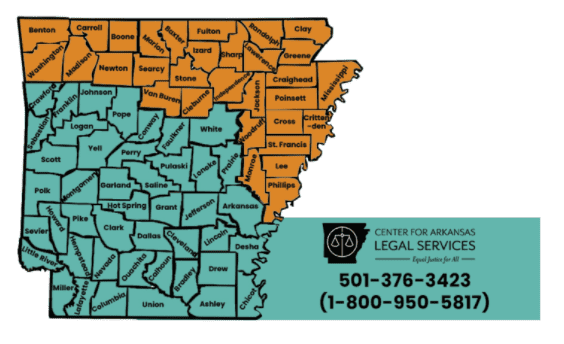The Center for Arkansas Legal Services (CALS) provides free civil legal aid to low-income Arkansans to help protect their health, family, and property. The Center does not handle criminal charges, car wrecks, or slips and falls. Additionally, the team makes presentations and offers clinics on Arkansas law for all income levels.
Attorneys, Sarah Cowan, and Helen Newberry, in collaboration with the Saline County Library, presented “Seniors and the Law” on Friday, March 25. This event was hosted by HSV Coronado Center Library with HSV Librarian, Glenda Ford, introducing the guests. Attorney Zach Baumgarten was also present. At the end of the presentation, the attorneys were available for brief private consultations.
Helen Newberry began the presentation with Sarah Cowan following up.
Helen Newberry:
Areas of Law Where CALS Can Help Low-Income Arkansans
The Center can help low-income folks with civil legal aid, including:
- Housing
- Family law
- Debt and bankruptcy
- End of life planning
- Public benefits such as Social Security
- Debt collection and bankruptcy
- Disaster services (FEMA appeals)
- Assistance to veterans and clinics for veterans
- Criminal record sealing
- Assistance to family members of someone suffering from substance abuse disorder
Scams
Ms. Newberry said that she knows she is not the only person who has received a text message from Circle K saying, ‘click on this link and get your rewards.’ She said her favorite scam is when the IRS calls her and tells her she is going to be arrested.
“If something seems really suspicious and seems too good to be true. It probably is.”
“Your bank is not going to email you and ask for a password. If you get an email like that and you are afraid it is real; call your bank. Don’t respond. Don’t click on those things.”
“The IRS is never going to put a warrant out for your arrest. And they are definitely not going to call you and tell you about it.”
IRS tax bill scams – You may receive an email saying to click on this link to pay your IRS tax bill. “The government is not going to email you or call you saying you need to pay. You will receive official notice.”
Beware of websites that want you to sign up for free service by providing your credit card number. This is common with free credit reports.
Beware of people or businesses that want you to pay by gift card, prepay debit card, or wire transfer. “That is the biggest red flag.” An example of this may be if someone calls you and says your grandson needs money. Don’t send it until you talk to your grandson.
Sometimes people will advertise units for rent and they want you to send the money for a background check before they even show you the house. “The house probably doesn’t exist.”
If you think someone is trying to pull a scam on you, go here to file a complaint.
Wills
Ms. Newberry said that if you have made a will or power of attorney in another state, it still counts here. “You might want to go ahead and update it, just because wills should be updated every once in a while.” If a new will has not been executed, then your previous home state will control how your assets are distributed, when probate occurs.
The person who handles your will is called the executor. He/she disposes of your estate after you pass on. If you have a power of attorney over someone and they pass away, the power of attorney ends and the executor is in control of the estate.
When naming an executor of your will it should be someone you can trust and some who is willing to do the job. Choosing a backup executor is also a good idea.
Ideally, a will should be updated if a close family member dies, if you divorce or marry, the decline of the health of you or your spouse, anytime you receive an important medical diagnosis, and at the beginning of every decade of your life.
Where Should You Store Your Will?
- Safe-deposit box – make sure somebody knows where it is and how to get to it.
- Online cloud storage
- Fire and waterproof storage containers
- You can file your will at the probate court, but this is unusual.
- Store the documents in a book such as a family Bible and place them on a top shelf in case of flooding.
- Give a copy of your will to your agent of your power of attorney or the executor of your will.
Living Will
Also known as an advanced directive, a living will is a document that specifies to medical professionals and your family what kinds of medical care you do or do not want when you are no longer able to express your wishes. A living will addresses whether you wish to be placed on a ventilator, or a feeding tube. What kind of pain management and procedures do you want? Do you want a ‘Do Not Resuscitate’ directive? You can also use a living will to make directives about organ and tissue donations.
Probate
When a homeowner with a will passes away the house usually has to go through probate. This can be a time-consuming and expensive process. One advantage of avoiding probate is this helps to avoid loss of the home to Medicaid.
Avoiding Probate
Ms. Newberry advises people to do as much as they can to pass on their property outside of probate.
- Life insurance proceeds are distributed according to who the beneficiary is. (This is not a probate item.)
- Assign a beneficiary to bank accounts to prevent the account from going through probate upon the death of the owner.
- Beneficiary deed – You assign someone to be a beneficiary on a deed, which is revokable (not permanent if you change your mind).
- A life estate is not revocable, but it is one way to avoid probate.
- Trusts – you create an entity that owns all of your property. If you pass, the property really is not yours but belongs to the trust and what happens to the property depends on what the trust document states.
- Owning something as a tenant by the entirety. This is how you can own property with your spouse. If a couple owns a home, the property automatically goes to your spouse. Even if there are other heirs, it doesn’t matter because of the way the property is owned.
Fair Housing Act
Fair Housing Act – Passed in the ’60s to Protect People From Discrimination Based On:
- Age
- Sex
- Gender
- Race
- National origin
- Religion
- Disability
- Familial status (Some places don’t like to rent to people with children, but senior communities are exempt.)
Exceptions to Fair Housing Act
- Renting out rooms in a home where the owner resides
- Less than 4 units (4 houses or apartments)
Types of Discrimination
- Refusal to rent or sell
- Refusal to negotiate
- Denying housing
- Creating different terms
- Trying to steer someone towards a certain location
- Mortgage discrimination
- Lying about the availability of a house
Housing Rights of the Disabled
Right of Disabled People to Make Changes to the Unit
Disabled people can request that changes be made to the home regarding accessible entrance (ramp or lift), doors that are wide enough for a wheelchair or walker, reachable light switches, outlets, and thermostats. In addition, a disabled person can request reinforced bathroom walls for the purpose of installing grab bars and kitchen and bathrooms that are wide enough for wheelchairs.
The landlord does not have to pay for these changes. You can ask for the modifications to be made, but you have to pay for them. The landlord can require that a professional perform the modifications. It is illegal for a landlord to refuse to allow these accommodations.
Emotional Support Animals
Emotional support animals should be allowed to reside with renters in a “no-pet” apartment.
Social Security/Social Security Disability/Medicaid
- CALS will help with Social Security disability claims after the first rejection. SSD denies almost everyone the initial time.
- CALS helps with denials and terminations of Medicaid.
- If you are overpaid Social Security payments, CALS will help with this.
Sarah Cowan:
Sarah Cowan, Family Law Expert, specializes in guardianship, and substance abuse disorder.
Guardianship/Power of Attorney for Minors
Neither guardianships nor powers of attorney terminate parental rights. Both are considered to be temporary measures, but guardianship can become permanent. The parent retains the power to revoke the power of attorney, as it is not a court order issued by a judge.
Guardianship
Guardianship is a court process. This involved a situation where a child’s parent(s) is/are unfit to care for the child and provide for the child’s basic needs. There is a multi-factor test where the court may say because of x, y, and z, the parent(s) is/are not capable of raising the child.
The minor guardianship process begins with the court being petitioned. The other party is served. There is a chance for the party to answer and a hearing. The judge then makes a determination on the fitness of the parent(s).
Power of Attorney
A power of attorney may be given when a parent is temporarily unable to provide and care for their child. A power of attorney document is executed between the parent and the proposed custodian. This does not require a court proceeding. This custodian is authorized to provide care for the child with issues such as school registration, medical care, etc.
Adult Guardianship
Competency is what is at issue with adult guardianship. A doctor must provide an affidavit or testimony that the proposed ward is not competent.
Items Court Considers Before Ordering Adult Guardianship:
- Can they manage their own health, safety, or finances?
- Are they disabled?
- Is the potential ward incapacitated at all?
- Is guardianship in the best interest of the ward?
In order to be named a guardian, one must be 18 or older, and an Arkansas state resident. You must also be of sound mind.
The guardian of an adult ward provides for the day-to-day care of the ward.
You can be a guardian of a person and/or a guardian of the estate. If you are the guardian of a person’s estate, you must file a report every year with the court. The required information to be filed is in regards to the ward’s well-being, and also financial/estate information.
The process to obtain adult guardianship is to file a petition in the circuit court where the ward lives. The ward must be served with the petition and receive very specific notice of the hearing and notice of rights. An evaluation of the proposed ward within the past six months by a physician who has experience with the ward is needed. If there is not a physician already, then the judge may order a medical evaluation. Next, a hearing occurs. If guardianship is ordered, the guardian should easily be able to access the order at all times.
Sometimes there are services that can be provided to a person so that a guardian is not needed.
Termination of Guardianship
Termination of guardianship may be necessary if the guardian moves out of state, competency is restored, or it is no longer in the best interest of the ward to have a guardian.
Things that Can’t be Used to Prove Guardianship is Necessary
- Failure to follow advice – we may not like the way someone is managing their money, but that doesn’t necessarily mean a guardian is needed.
- Failure to act in one’s own best interest – Because someone gives money out foolishly doesn’t mean they are incapacitated.
- Alzheimer’s or Dementia is not an immediate indication of incapacity. The court will still need to make the determination based on physician reports.
Several Types of Powers of Attorney
The agent is the person named to act on your behalf in a power of attorney.
- General power of attorney – This allows the agent to handle all of your affairs. If the principal becomes incapacitated, this is no longer in effect. This is revokable at any time.
- A durable power of attorney – This limited power of attorney remains valid if the principal becomes incapacitated. This is revokable before the principal becomes incapacitated. The durable power of attorney is created to be used if someone becomes incapacitated.
- A medical power of attorney – This limited power of attorney allows an agent to make medical decisions on behalf of the principal. At the time of the creation of the medical power of attorney, the principal must have the capacity to make decisions.
Contact Information for Low-Income Civil Legal Help
The Center for Arkansas Legal Services serves the central to the southern half of the state. Please go here or call (501) 376-3423 or 1-800-950-5817.
If you are low-income, need legal assistance, and live in the northern portion of Arkansas, please call 1-800-952-9243 or go here to visit Legal Aid of Arkansas.

✬ ✬ ✬ ✬ ✬
Saline County and HSV Library
Much thanks to the Saline County Library and Hot Springs Village Library for coordinating this event.
Alan Robinette, Saline County Librarian was at the event to sign up people for a Saline County Library card. If you are a Hot Springs Village resident, no matter if you live in Saline or Garland County, you qualify to receive a free Saline County and Garland County Library card.
HSV Librarian Ford said that even though the HSV Library does not have E-books, they have the latest printed books. E-books are books you read on your Kindle or your iPad. Saline Country Library does have E-books.
The HSV Library keeps track of visitors and when you visit them, it helps to keep the numbers up. Ms. Ford explained, “We do have the latest and the greatest print books available at our library.”
CHERYL DOWDEN, Hot SpringsVillage People Gazette, March 27, 2022
✬ ✬ ✬ ✬ ✬
We are glad you dropped in to visit Hot Springs Village People Gazette. If you like, please comment below; we love to hear your opinions. Thank you for keeping the comments polite and on topic. Please use your first and last real name. We promote local businesses, events, and organizations! Let us know if we can help. We also accept opinion pieces and articles from guest authors. We can be contacted through this website; just click the contact button and let us know what’s on your mind. Be sure to bookmark this site and come back to visit with us often as our content is frequently changing. If you are an HSV Property Owner, click here to visit and join a private Facebook Group.












Katherine Miller
03/29/2022 — 11:02 pm
Thank you for posting this helpful information.
HSVP C
03/30/2022 — 4:12 am
My pleasure, Katherine.